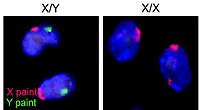
Photo from wikipedia
Abstract STUDY QUESTION Which set of antibodies can be used to identify migratory and early post-migratory human primordial germ cells (hPGCs)? STUDY FINDING We validated the specificity of 33 antibodies… Click to show full abstract
Abstract STUDY QUESTION Which set of antibodies can be used to identify migratory and early post-migratory human primordial germ cells (hPGCs)? STUDY FINDING We validated the specificity of 33 antibodies for 31 markers, including POU5F1, NANOG, PRDM1 and TFAP2C as specific markers of hPGCs at 4.5 weeks of development of Carnegie stage (CS12–13), whereas KIT and SOX17 also marked the intra-aortic hematopoietic stem cell cluster in the aorta-gonad-mesonephros (AGM). WHAT IS KNOWN ALREADY The dynamics of gene expression during germ cell development in mice is well characterized and this knowledge has proved crucial to allow the development of protocols for the in vitro derivation of functional gametes. Although there is a great interest in generating human gametes in vitro, it is still unclear which markers are expressed during the early stages of hPGC development and many studies use markers described in mouse to benchmark differentiation of human PGC-like cells (hPGCLCs). Early post-implantation development differs significantly between mice and humans, and so some germ cells markers, including SOX2, SOX17, IFITM3 and ITGA6 may not identify mPGCs and hPGCs equally well. STUDY DESIGN, SIZE, DURATION This immunofluorescence study investigated the expression of putative hPGC markers in the caudal part of a single human embryo at 4.5 weeks of development. PARTICIPANTS/MATERIALS, SETTING, METHODS We have investigated by immunofluorescence the expression of a set of 33 antibodies for 31 markers, including pluripotency, germ cell, adhesion, migration, surface, mesenchymal and epigenetic markers on paraffin sections of the caudal part, including the AGM region, of a single human embryo (CS12–13). The human material used was anonymously donated with informed consent from elective abortions without medical indication. MAIN RESULTS AND THE ROLE OF CHANCE We observed germ cell specific expression of NANOG, TFAP2C and PRDM1 in POU5F1+ hPGCs in the AGM. The epigenetic markers H3K27me3 and 5mC were sufficient to distinguish hPGCs from the surrounding somatic cells. Some mPGC-markers were not detected in hPGCs, but marked other tissues; whereas other markers, such as ALPL, SOX17, KIT, TUBB3, ITGA6 marked both POU5F1+ hPGCs and other cells in the AGM. We used a combination of multiple markers, immunostaining different cellular compartments when feasible, to decrease the chance of misidentifying hPGCs. LARGE SCALE DATA Non-applicable. LIMITATIONS REASONS FOR CAUTION Material to study early human development is unique and very rare thus restricting the sample size. We have used a combination of antibodies limited by the number of paraffin sections available. WIDER IMPLICATIONS OF THE FINDINGS Most of our knowledge on early gametogenesis has been obtained from model organisms such as mice and is extrapolated to humans. However, since there is a dedicated effort to produce human artificial gametes in vitro, it is of great importance to determine the expression and specificity of human-specific germ cell markers. We provide a systematic analysis of the expression of 31 different markers in paraffin sections of a CS12–13 embryo. Our results will help to set up a toolbox of markers to evaluate protocols to induce hPGCLCs in vitro. STUDY FUNDING AND COMPETING INTEREST(S) M.G.F. was funded by Fundação para a Ciência e Tecnologia (FCT) [SFRH/BD/78689/2011] and S.M.C.S.L. was funded by the Interuniversity Attraction Poles (IAP, P7/07) and the European Research Council Consolidator (ERC-CoG-725722-OVOGROWTH). The authors declare no conflict of interest.
Journal Title: Molecular Human Reproduction
Year Published: 2018
Link to full text (if available)
Share on Social Media: Sign Up to like & get
recommendations!